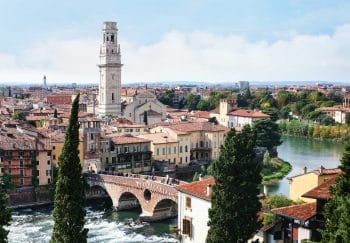It was a pleasure to revive the Italy Blogging Roundtable. Now, imagine my delight to announce that we have a new contributor. Michelle Fabio , a long-time friend and blogger, joins the roundtable. I know she will bring her trademark blend of wit and thoughtful analysis to our group.
This month’s theme is TRANSLATION.
When I was young, the word pithy was something I heard. I created my own meaning for it, which was completely different from the original meaning. Pithy was my ideal description of an apple with a slightly soft texture. It has a grainy texture. Unaware of the contents, you bite into it and want to spit out all of it.
Pithy, in other words.
(Yes, I still do use it this way. Even though I know better.
This can happen in one’s native language. If you have the “this word sounds like it should be X but it actually means Y”, experience, it is possible to get very complicated when trying to translate between languages.
False Friends
One of my Italian teachers warned me early in my studies to watch out for falsi amici (or “false friends”) – Italian words that are similar enough to English words to make us assume they mean the exact same thing. Sometimes the assumption that the words are the same thing is fine. However, many times the meanings of words can be confusing and cause confusions.
These are some common falsi amici examples:
- camera You might think it means camera, but it is not. It can also refer to room.
- fattoria You might think it means factory. But it doesn’t. It can also be translated as farm.
- libreria You will not be able to go into this storefront if you don’t have your local library card. It’s a bookstore.
- peperoni You might think you are ordering cured salami with your pizza. You are ordering peppers.
- stampa– This is the way to send a postcard. However, this word can also be used to refer to press or print.
There are many lists of Italian fake friends online. This is the longest list I found. It can be accessed by using the alphabet tabs at the side. The list of falsi amici that are causing you trouble can be confusing at the beginning. However, as you get more fluent in the language, the list will become shorter.
False friends are the hardest thing for me to overcome.
False sense of security
It’s no surprise that Italian culture is all around the globe. Many of us fall into a false sense security when we plan to visit Italy. These are not our fault. We’ve become so used to thinking things are certain, it’s easy to fall for these assumptions.
Partly, I began writing about Italy because I wanted people to get over their false sense of security. This would allow them to face less cultural misunderstandings and have an easier trip. It’s been a long time since I have had to give the equivalent of the “you think that you know, but don’t know” speech on many topics.
I have spoken previously about . It’s also not offensive when it’s used everywhere else around the world. These are just a few examples of the false sense we bring to Italy of our security.
Coffee Italian
Although I am not a coffee aficionado like my friends, I don’t love Starbucks. Although it is a “any port in an storm” coffee stop for anyone who wants to traverse any espresso wasteland with their coffee, I find their coffee tasteless. The thing that bothers me most about Starbucks is the way it makes us think we can speak Italian coffee.
The American latte is an espresso with lots and milk. However, the term itself means “milk” in Italian. A latte in an Italian bar will come with a glass of milk.
Another complaint about coffee-related language is the presence of crispy cookies in the vicinity of the cash register. You’ll often ask for “one Biscotti” in the U.S.
It’s possible that Italian baristas have come around to this, giving the benefit of doubt to non-Italians and only handing over one cookie despite the awkward phrasing. But it’s another time when we can be proud to complete a transaction, only to discover later about the error.
You can get very picky and look at the ounces in Starbucks drinks. The “venti,” which in Italian means “twenty,” has 24 ounces, while the “trenta,” or “thirty”, has 31 ounces.
This drives me crazy as a detail person.
These are minor issues, but they’re not major. It’s not difficult to imagine how simple it would have been for these things to be correctly translated into U.S. culture. Is it intentional? Why reinvent the wheel?
Transactional Italian
There was a campaign for Visa check cards many years ago that suggested anyone who paid cash for any item was either a luddite or a fool.
I am one of those Americans who rarely carries cash in the U.S. but that mindset is not common in Italy – a country Visa’s commercials praise. Yes, larger stores and hotels accept plastic but many places won’t. Or they’ll tell you that they won’t because it’s too complicated or because cash payments make it less trackable.
Cash is the king in Italy.
Food Italian
Dining is the most dangerous area of an Italy trip that we take with a false sense security.
We have all been to Italian restaurants in other countries, and many claim that they are authentic. So we believe we know how to navigate an Italian menu. My introductory Italian students used to say that they would not starve in Italy no matter what happened. They knew so many food terms.
True to a certain extent. However, it is true that many Italian restaurants outside of Italy cater more to local customers than they try to be authentically Italian. My local Italian restaurant serves spaghetti and meatballs, a dish that isn’t on the Italian menu. Fettucine alfredo, another American invention, is loosely based on an innocuous dish that Italians offer to expectant mothers to ease morning sickness. As mentioned, children who are excited to try their first pizza in Italy will be shocked when their “peperoni pizza” turns out to have – gasp! – Vegetables instead of salami.
It works both ways
Italians are familiar with many English words. You may be reading this article on “il Computer” but they have twisted them into unique phrases that are uniquely their own. They refer to basketball as “basket”, and smoking is used to describe a tuxedo jacket. When they say “farefooting” (literally to make footing), they are implying that they are jogging.
These are the things that will make them feel like they’re in trouble when they travel to English-speaking countries. It’s just like how we confuse ourselves with Italian words.
Even if we pay close attention to translations, there are many mistakes we can make. The confusion only increases when so many words are merged between our languages. You won’t have all the falsi amici you need before you go to Italy. And you might forget to ask for “un Biscotto” instead. We all make mistakes. But, if we are conscious, we can learn from them.
You never know what you might order. Maybe you accidentally order a pizza with peppers all around it. And you’ll like it more than the spicy salami that you originally planned.
Italy Roundtable: Other Voices
You can click through each link to see this month’s posts from Roundtablers. Please leave comments and share them with friends. And don’t forget to tune in next month to learn more about Italy Blogging Roundtable!
- ArtTrav The alphabet for impossible Italian translations
- At Home in Tuscany – Senza parole…
- Bleeding Espresso Lost in Translation – Adventures in Solatude
- Brigolante – Lost in Translation
- Driving like a Maniac Things my Sicilian Girlfriend and I argue about
- Italofile Lost In Translation: Ancient Stories in Art
Are we connected?
Have you LIKED us on Facebook? Are you following our Twitter? We’re very friendly, so please drop by to say hello. We are always open to suggestions for future topics for the Italy Blogger Roundtable. Drop us a message on Facebook, Twitter, or comment on any of our posts.











